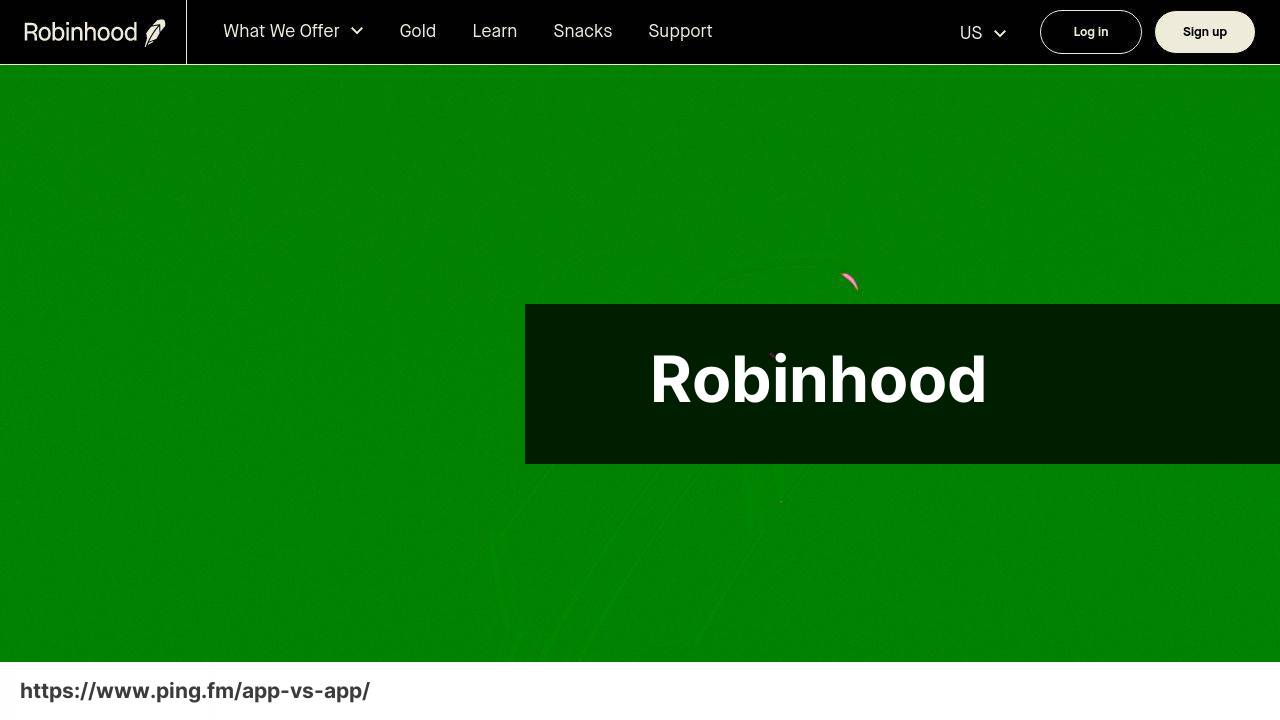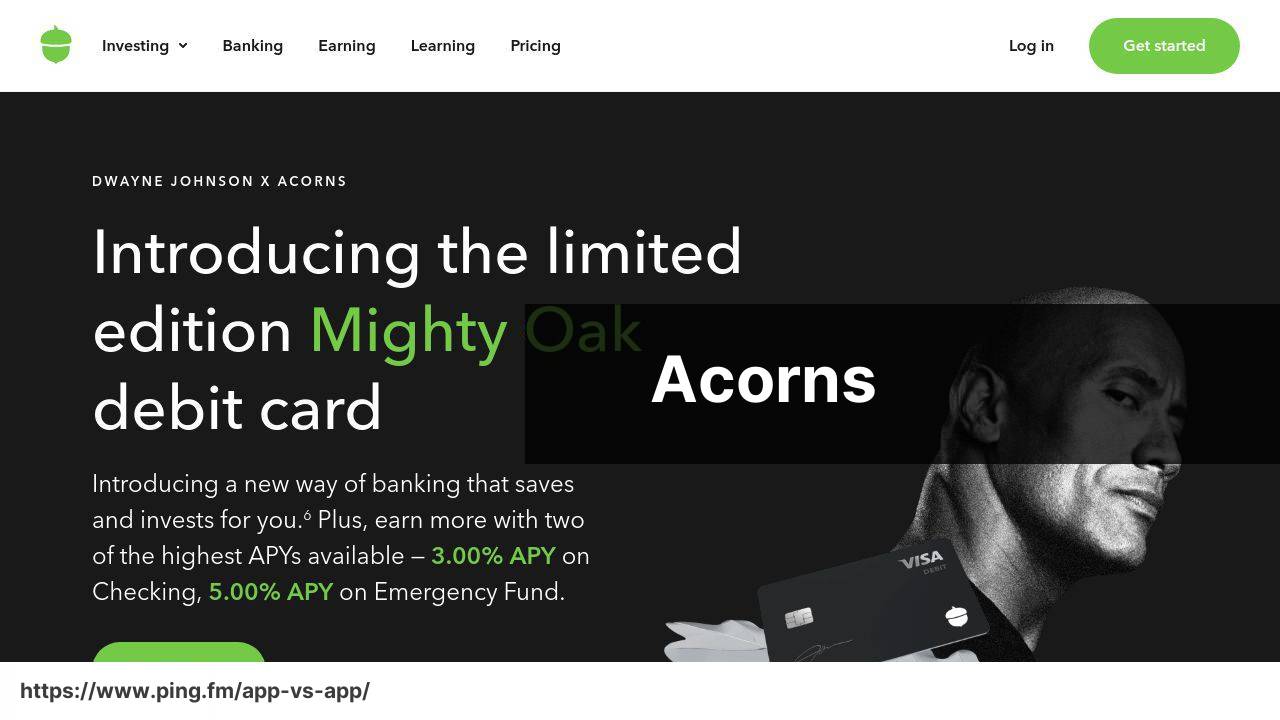Last update on
Acorns vs Robinhood (best investment apps / software for beginners)
Compare | Winner | |
| User Interface | ||
| Ease of use | ||
| Educational Resources | ||
| Features and Tools | ||
| Fees and Charges | ||
| Customer Service | ||
| Security and Safety | ||
| Investment Options | ||
| Withdrawal Options | ||
| Performance | ||
| FREE / PAID | Robinhood offers free stock trades, while the premium ‘Gold’ membership costs $5/month. | Acorns offers three plans: Lite ($1/month), Personal ($3/month), and Family ($5/month). |
| Conclusion | Robinhood shines with commission-free trades! 💸🚫✨But beware: it lacks robust educational tools. 👩🎓📚⚠️ | With Acorns, investing change becomes a breeze! 🌬️🍃 Its spare change investment feature is perfect for beginners. 👶💹 A bit pricey for its features though. 💸⚖️ |
Robinhood Pros & Cons
No Commission Trades 💸🚫
Fractional Shares 📊⚖️
Cryptocurrency Trading 💱
Extended Trading Hours ⏱️⏳
Fast Account Setup ⚡️🆕
Acorns Pros & Cons
Automatic Round-Ups 🔄⬆️
Cashback Rewards 📤💰
Recuring Investments 💹🔄
Family Accounts 👨👩👧👦
Educational Content 🧠📘
Retirement Options ✨🏖️
No Robo-Advisor 🤖❌
Limited Research Tools 🔍🚫
No Mutual Funds 🤝❌
No Retirement Accounts 🏖️🚫
Limited Customer Support 📞⏳
Frequent Outages 📉🚫
High Fees 💸⬆️
Limited Investment Options 📊🚫
No Direct Indexing 📈❌
Customer Service Complaints 📞😔
No Tax-Loss Harvesting 🌾💲🚫
Other best investment apps for beginners
Stash- where budgeting meets investing! 💰🔀💹 Offers thematic investments but charges fees for basic services. 💲🔄📊
Betterment stands out with its robo-advisor feature! 🤖✨ But don’t forget, there are no direct indexes or fractional shares. 📈🚫⚖️
Wealthfront: Taking the wheel with auto-investing! 🚗💨 Has high account minimum which might be a bummer. 😕⏫
FAQ
What are some investment apps suitable for beginners?
Investing apps that are great for beginners include Acorns and Robinhood. These apps are designed to be user-friendly and educate users about investing. They also offer affordable investing with minimal fees.
Can you explain how the Acorns app works?
Acorns is an app that allows users to make investments using the change from their daily purchases. When you link your credit or debit cards to the app, it rounds up your purchases to the nearest dollar and invests the difference. It’s a simple and effective way to start investing, especially for beginners.
What makes Robinhood an excellent platform for new investors?
Robinhood is known for ushering in commission-free trades. It offers a straightforward platform that lets users buy and sell stocks, ETFs, options, etc., all with no account minimum. It is a go-to for first-time investors because of its easy-to-navigate interface and cost-effectiveness.
Are these investment apps safe?
Yes, both Acorns and Robinhood are heavily secured and use high-level data encryption to protect users’ information. They also are members of the Financial Industry Regulatory Authority (FINRA), insuring users up to $500,000 in securities.
What fees do Acorns and Robinhood charge for their services?
Acorns charges a monthly subscription fee ranging from $1-$5 depending on the services you use. Robinhood, on the other hand, offers commission-free trades though there are charges for premium services such as Robinhood Gold.
Do these apps offer educational resources for beginners?
Yes, both Acorns and Robinhood offer educational resources designed to help beginners understand investment strategies and the stock market. They provide articles, videos, glossaries, and more that are easy to understand and informative.
Is it possible to perform trades in real-time with Robinhood?
Yes, Robinhood supports real-time trades. Users can place trades during the market hours as well as during pre-market and post-market hours.
What kind of investments can I make with Acorns?
Acorns uses your spare change to invest in a portfolio of ETFs and bonds. It also offers retirement accounts through Acorns Later and a checking account with a debit card through Acorns Spend.
How does Robinhood make money if it offers commission-free trades?
Robinhood makes money in several ways such as through premium services like Robinhood Gold, earning rebates from market makers and trading venues, and through interest from cash and securities in Robinhood accounts.
Do these apps allow you to buy fractional shares?
Yes, both Acorns and Robinhood offer the option to purchase fractional shares. This feature lets investors buy portions of a company’s stock instead of an entire share, making investing more accessible for people with lower budgets.
What differs in investing approach between Acorns and Robinhood?
Acorns focuses on passive, automatic investing while Robinhood gives users more control for active trading. Acorns invests your spare change in a portfolio, while Robinhood allows for direct stock, ETF, and option trades.
Is it possible to track my investments through Acorns and Robinhood?
Yes, both Acorns and Robinhood have interfaces that allow you to track your investments, view your balance, and see your potential gains or losses in real-time.
Do Acorns and Robinhood offer Individual Retirement Account (IRA) options?
Acorns offers an IRA option through Acorns Later. However, Robinhood currently doesn’t offer any retirement account options, but allows investing in a wide range of securities that you could use in an IRA from another broker.
How quickly can trades be executed on Robinhood?
Unless you encounter unusual market conditions, trades on Robinhood are typically executed instantly during market hours. It’s one of the features that make Robinhood very appealing to users.
What kind of customer support does Acorns offer?
Acorns offers customer support through email. On their website, there’s a Help Center containing frequently asked questions which can be helpful for users seeking immediate answers.
How accessible are Robinhood’s educational resources?
Robinhood offers a suite of resources under Robinhood Learn. It has free, beginner-friendly learning materials about investing, economics, and personal finance, backed up by trends, data, and easy-to-understand explanations.
Can I link more than one bank account to my Acorns account?
Yes, you can link multiple bank accounts to your Acorns account. However, only one account can be used for round-ups at a time.
Are dividends reinvested automatically on Robinhood?
Yes, Robinhood offers a feature called Dividend Reinvestment Plan (DRIP), which automatically reinvests your dividends back into the stock or ETF. This makes it easy to put your earnings back into your investments.
Are there any tax implications for using Acorns or Robinhood?
Yes, investing through Acorns or Robinhood may have tax implications. Depending on the type of investing you do and the profits you make, you may have to report your earnings in your annual tax filings. It’s essential to consult with a tax advisor to understand the specific implications for your situation.
What devices can I use to access the Acorns and Robinhood apps?
Both the Acorns and Robinhood apps are available on iOS and Android devices. They also have web versions, allowing you to manage your investments from virtually anywhere.
What are some of the best investment apps suitable for beginners?
The common choices among beginners include Acorns and Robinhood, renowned for their user-friendly interfaces and beginner-focused investment strategies. Besides them, other suitable apps for novices include Stash, Betterment, and M1 Finance.
Can you define Acorns as an investing platform for a beginner?
Acorns is considered an excellent platform for beginners in investment. It requires very low starting capital, as little as a few cents, and lets users round up daily purchases to invest the spare change automatically. It’s an effortless way to familiarize inexperienced users with the concept of investing.
How does Robinhood stand out among other investing applications?
Robinhood has made its mark by offering commission-free trades, a feature highly popular amongst beginning investors. Its simple layout and easy-to-understand features make the investing process less daunting for new entrants.
Are these investment apps like Robinhood and Acorns free to use?
Both Robinhood and Acorns offer free to download apps. However, while Robinhood charges no commission for trades, Acorns has a minimal fee structure starting at $1 per month for basic investment accounts.
What are some unique features of the Acorns investment app?
Acorns stands out with its automatic ’round-ups’ feature where it rounds up your purchases to the nearest dollar and invests the change. It also offers automated portfolios devised by experts, making it easy for beginners to begin their investment journey.
What can you tell me about Robinhood’s cryptocurrency trading?
Robinhood introduces the feature of trading cryptocurrencies like Bitcoin, Ethereum amongst others. This function is a great way for beginners to dip their toes into the world of cryptocurrency without needing a separate platform.
Is investing through apps like Robinhood and Acorns safe?
Both Robinhood and Acorns are regulated by major financial entities like the Securities and Exchange Commission (SEC). They use encryption to protect user data. However, as with any investment, bear in mind that your capital is at risk, and investments can go up or down.
Do Robinhood and Acorns offer educational resources for beginners?
Yes, both Robinhood and Acorns provide a wealth of educational resources for beginners. Acorns offers ‘Money Basics’, a section on its website with articles and advice on investment, while Robinhood offers ‘Learn’, a similar resource full of educational articles.
Are there any minimum deposit requirements for Acorns and Robinhood?
Robinhood has no minimum deposit requirement to open an account and start investing. In contrast, an Acorns account requires a $5 initial deposit to start investing.
What is the procedure for opening accounts in these apps?
For both Acorns and Robinhood, the account registration is a streamlined process. Users need to download the apps, fill in personal information, and complete a short questionnaire about their financial situation and investment goals. Approval usually takes a few working days.
Can I use these apps on both iOS and Android devices?
How can the users of these apps manage their portfolio?
Acorns offers an automated portfolio created by experts, while Robinhood allows complete freedom to select and invest in different stocks, ETFs, and cryptocurrencies. Both platforms boast easy-to-understand dashboard for tracking investment progress.
Do Acorns and Robinhood facilitate withdrawal of funds at any time?
Yes, both Acorns and Robinhood allow the withdrawal of funds, usually taking three business days after selling your investments. However, Robinhood offers instant access to funds up to $1,000.
Can you provide insights into the customer support provided by these platforms?
Robinhood provides email support and has a comprehensive FAQ section on their website. Acorns offers phone support from Monday to Friday, besides the FAQ section on their website.
Do these platforms allow investing in international stocks?
Robinhood offers investing in a selection of global companies with ADRs (American Depository Receipts), but non-U.S. stocks aren’t available. Acorns invests your money in diversified portfolios including international stocks and bonds.
Are these platforms suitable for long-term investments?
Yes. Both Acorns and Robinhood are well-suited for long-term investing. Acorns’ automatic investment feature makes it easy to continuously invest, while Robinhood’s versatile investment options can align with various long-term investment strategies.
Can users reinvest their dividends in these apps?
Currently, only Robinhood allows dividend reinvestment through their DRIP (Dividend Reinvestment Plan) feature. Acorns does not provide an option to reinvest dividends.
What’s the investment strategy that Acorns adopts?
Acorns uses a strategy based on the Modern Portfolio Theory. It creates diversified portfolios of ETFs (Exchange Traded Funds) across several asset classes, optimized for varying levels of risk tolerance.
Do these platforms support options trading?
Robinhood supports options trading with no commission fees. However, Acorns does not offer options trading, focusing instead on simplified investment approaches.
Can I invest in mutual funds in these apps?
Neither Robinhood nor Acorns support mutual funds. They focus on other investment avenues like stocks, ETFs, and in Robinhood’s case, cryptocurrencies and options.
 ping.fm
ping.fm 

